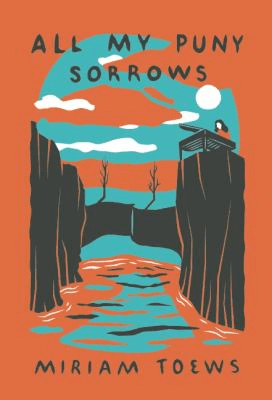Suicide. It’s a topic that elicits grief, guilt, sadness, confusion and judgement from those left behind and their friends and coworkers.
Conversations about suicide usually contain phrases like, “tragic,” “such a shame,” “what a pity” and “why would anyone want to kill themselves?”
In her latest book, All My Puny Sorrows, Miriam Toews cuts through the cliches and poses a question: Should we do all we can to hang on to those who want to end their lives? Or should we help them die in a kind, compassionate and painless way?

Elfrieda, a successful concert pianist with a loving husband, wants to commit suicide. Her sister Yolanda desperately tries to get Elf to want to live, without success.
After a failed attempt on her own life, Elf begs Yoli to take her to Zurich, Switzerland, where assisted suicide is legal. Yoli debates. She researches drugs she could get in Mexico to painlessly end her sister’s life and how much the procedure and plane tickets to Zurich would cost.
Yoli wants to help her sister, but she also doesn’t want to lose her sister.
The almost stream-of-conscious first-person narration lends itself well to this emotion-heavy tale, as does the complete lack of quotation marks.
The lack reinforces that we’re in Yoli’s head, not someone else’s. This is her story as much as it is Elfrieda’s–perhaps more so, because Elf already knows how she would answer the question posed by the narrative. Elf knows she wants to die, and she doesn’t want to die alone.
Yoli doesn’t want her sister to die alone, either, but she can’t figure out how to reconcile her fierce love for her sister with her sister’s equally fierce desire to cease living.
This is a beautifully devastating book, and I appreciate that Toews does not force an opinion on her readers. Yoli herself never quite comes to a decision, and the last few chapters are about her coming to terms with her inability to decide, to know what’s right.
Toews paints the relationship between the sisters and the rest of their family members in concrete scenes that illustrate the many ways we carry our loved ones with us. She uses Elf and Yoli’s father and cousin, who both committed suicide some years earlier, as test cases for Yoli accepting suicide as a valid, even noble, choice.
I found myself conflicted. Like Yoli, I both wanted Elf to live and to get what she wanted: death. As the book neared its conclusion, I found myself siding more and more with Elf. If it’s okay for terminally ill patients to end their lives before their suffering becomes too great (and I personally believe it is, though of course you may disagree), why not extend the same courtesy to someone with a crippling mental illness?
I suspect the answer lies somewhere in the middle, somewhere in the nuances of each person’s situation and circumstances, and not in a blanket proclamation that suicide is one thing or the other.
What do you think?
-Kelly
Should we have the right to die?
Check out All My Puny SorrowsKelly reads, writes and sometimes sews, always with a large mug of tea. Her job as the Clerical Specialist at CLP – West End gives her plenty of ideas for stories that find homes in obscure literary magazines.

